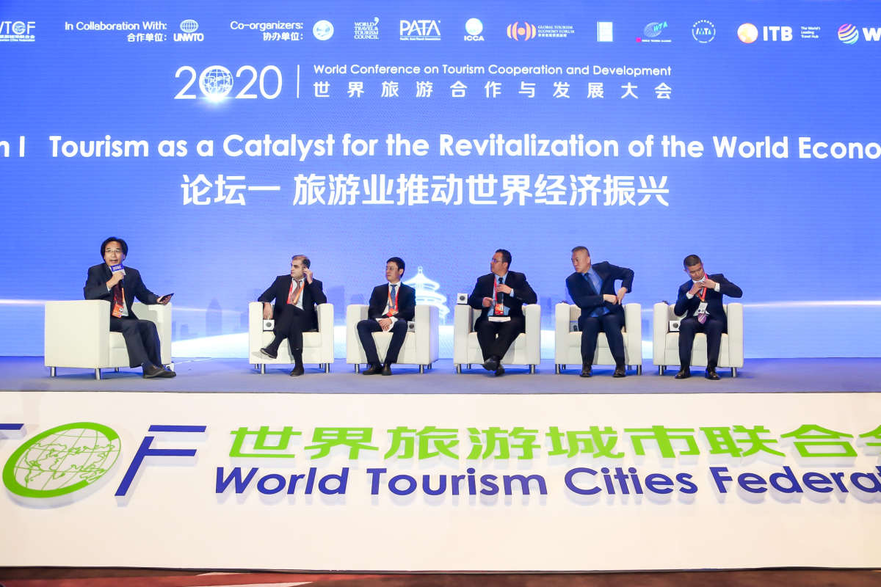On September 5th, the World Conference on Tourism Cooperation and Development, hosted by the World Tourism Cities Federation, was held in Beijing, one of the four summit forums conducted during the 2020 China International Fair for Trade in Services. Focusing on "Rebuilding World Tourism for Prosperity", the conference forum was themed "Tourism as a Catalyst for the Revitalization of the World Economy", aiming to promote the recovery of the global tourism industry, and provide constructive suggestions to restore its prosperity, through exchange and sharing.

"Tourism as a Catalyst for the Revitalization of the World Economy" Forum
Tiger Wu, WTCF Expert, Professor of Peking University, presided over the theme forum. Chang Yang, Vice President of Alibaba Group, delivered a keynote speech at the conference. Chang concluded that the major impacts of the current pandemic on the world were an acceleration of digitalization, growth in new business models, and changes in the capacity to consume. From his perspective, further improvements in, and new driving forces for, the development of the tourism industry were needed to accelerate its recovery. Taking Alibaba's practical experience as an example, Chang focused on the three major traits of the tourism industry's new growth drivers, namely intellectual property, digitalization, and green development. "We hope to utilize commercial infrastructure established over the past two decades, connect with users, provide a stronger incentive for world travel, and present culture with technology in order to aid in its revitalization".
One of the most important industries in the world economy, tourism has vital and stimulating effects on the world’s economic development and recovery. While promoting the rebound of world travel, governments of various countries have introduced policies to encourage the resumption of work and the recuperation of consumption. David Pipinashvili, Minister Counselor, Embassy of the Republic of Georgia in China explained that, after the outbreak of the epidemic, the Georgian government had launched tax reductions for enterprises and issued subsidies to support industrial development. It had also taken the initiative to adopt other measures, including free provision of land to investors, and tax reductions lasting until 2026. Thanks to the effective implementation of various anti-epidemic measures, Georgia had reopened its borders and international flights had gradually resumed. Anouar Chetoui, Chief Rept. of Tunisian National Tourist Office Beijing, said that in response to the epidemic, Tunisia and some other North African countries had united to create a new direction for tourism, providing an excellent opportunity for the recovery and development of the industry in Tunisia.
The outbreak of the COVID-19 pandemic has undoubtedly brought a huge challenge to the sector. Many companies have also actively initiated precautionary strategies to promote the revival of the tourism economy through localization, regionalization and digitization. Yu Dunde, Founder and CEO of Tuniu Corporation, explained changes in tourists’ modes of travel since the epidemic, giving the example of a "double reservation". "Almost all products now support the notion of double reservations. Tourists make a reservation online, sign a contract and book a seat. Then, they can determine the exact and final date before travel. Before the second reservation, all expenses can be refunded without penalty. Tourists have flexibility to adjust their travel times based on their own schedules and the overall circumstances of epidemic prevention and control." Wang Chunfeng, Vice President of UTour Group, said that with the gradual return of peripheral and inter-provincial tourism, UTour had quickly shifted its focus to the domestic market, launching a variety of domestic travel products. As of August this year, Utour had achieved its 1.1-billion-yuan revenue target. Wang believed that this demonstrates huge untapped potential for the development of the domestic tourism market and its products." Companies had to take the initiative to survive. “Only when companies take the initiative to change their business modules and adapt to market demands can they come out ahead."Cruise ships, the mobile holiday destinations, have also suffered a heavy blow during the epidemic.Roger Chen, Chairman of Carnival Group Asia, said that since the epidemic’s outbreak, cruise ship travel companies had been actively combating it in their own ways by working on business resumption plans, improving safety and quality, or developing innovative cruise ship travel products. Chen was able to announce one piece of positivity at the conference: the Trieste, Italy route of Costa Crociere, a subsidiary of Carnival, would be resuming on September 6th. "I believe that the cruise business is very promising, and its vitality is flourishing," Chen said.
The pandemic has presented coexisting challenges and new opportunities for further development in the industry. As Tiger Wu, WTCF Expert, said, "Product innovation remains the constant factor; risks, market demands, policies, and the times, these continually change."
Copyright ©1997- by CRI Online All rights reserved